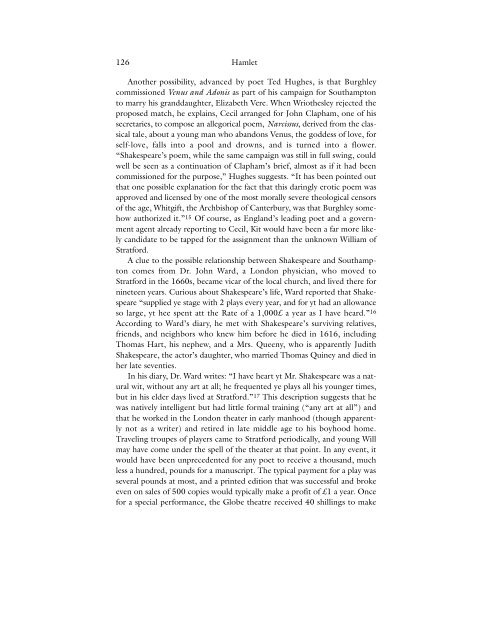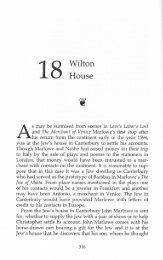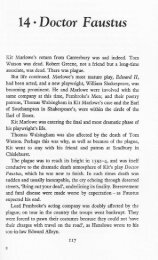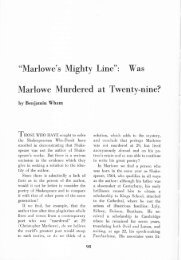Page 113-180 Shakespeare - The Marlowe Studies
Page 113-180 Shakespeare - The Marlowe Studies
Page 113-180 Shakespeare - The Marlowe Studies
Create successful ePaper yourself
Turn your PDF publications into a flip-book with our unique Google optimized e-Paper software.
126 HamletAnother possibility, advanced by poet Ted Hughes, is that Burghleycommissioned Venus and Adonis as part of his campaign for Southamptonto marry his granddaughter, Elizabeth Vere. When Wriothesley rejected theproposed match, he explains, Cecil arranged for John Clapham, one of hissecretaries, to compose an allegorical poem, Narcissus, derived from the classicaltale, about a young man who abandons Venus, the goddess of love, forself-love, falls into a pool and drowns, and is turned into a flower.“<strong>Shakespeare</strong>’s poem, while the same campaign was still in full swing, couldwell be seen as a continuation of Clapham’s brief, almost as if it had beencommissioned for the purpose,” Hughes suggests. “It has been pointed outthat one possible explanation for the fact that this daringly erotic poem wasapproved and licensed by one of the most morally severe theological censorsof the age, Whitgift, the Archbishop of Canterbury, was that Burghley somehowauthorized it.” 15 Of course, as England’s leading poet and a governmentagent already reporting to Cecil, Kit would have been a far more likelycandidate to be tapped for the assignment than the unknown William ofStratford.A clue to the possible relationship between <strong>Shakespeare</strong> and Southamptoncomes from Dr. John Ward, a London physician, who moved toStratford in the 1660s, became vicar of the local church, and lived there fornineteen years. Curious about <strong>Shakespeare</strong>’s life, Ward reported that <strong>Shakespeare</strong>“supplied ye stage with 2 plays every year, and for yt had an allowanceso large, yt hee spent att the Rate of a 1,000£ a year as I have heard.” 16According to Ward’s diary, he met with <strong>Shakespeare</strong>’s surviving relatives,friends, and neighbors who knew him before he died in 1616, includingThomas Hart, his nephew, and a Mrs. Queeny, who is apparently Judith<strong>Shakespeare</strong>, the actor’s daughter, who married Thomas Quiney and died inher late seventies.In his diary, Dr. Ward writes: “I have heart yt Mr. <strong>Shakespeare</strong> was a naturalwit, without any art at all; he frequented ye plays all his younger times,but in his elder days lived at Stratford.” 17 This description suggests that hewas natively intelligent but had little formal training (“any art at all”) andthat he worked in the London theater in early manhood (though apparentlynot as a writer) and retired in late middle age to his boyhood home.Traveling troupes of players came to Stratford periodically, and young Willmay have come under the spell of the theater at that point. In any event, itwould have been unprecedented for any poet to receive a thousand, muchless a hundred, pounds for a manuscript. <strong>The</strong> typical payment for a play wasseveral pounds at most, and a printed edition that was successful and brokeeven on sales of 500 copies would typically make a profit of £1 a year. Oncefor a special performance, the Globe theatre received 40 shillings to make






